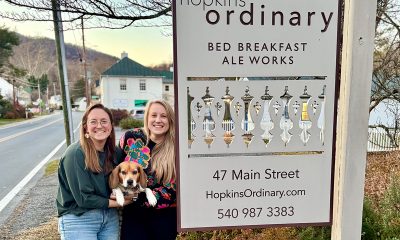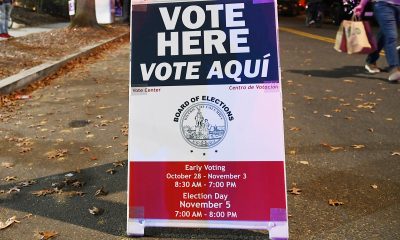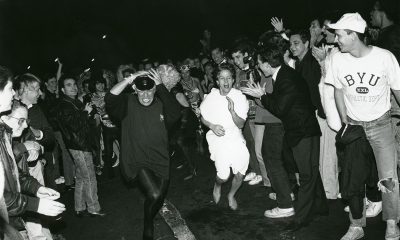Arts & Entertainment
More straight athletes joining gay leagues
Finding fellowship in addition to competition
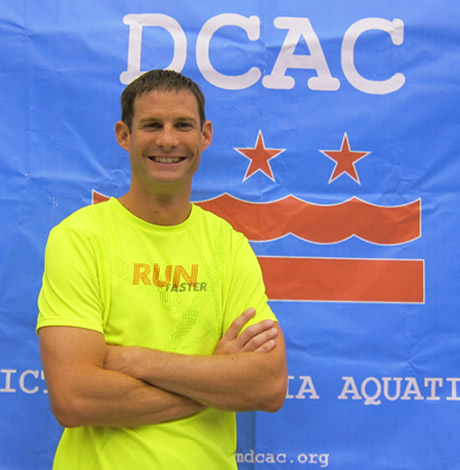
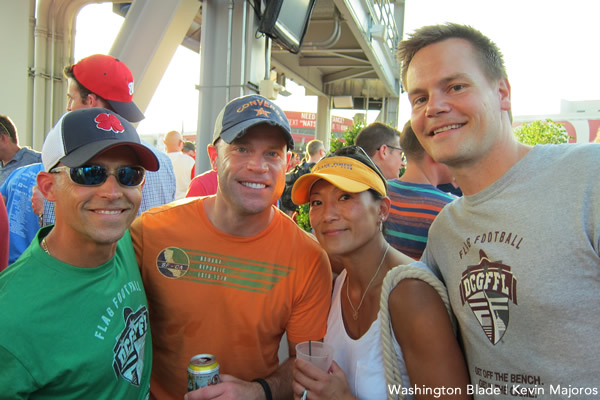
Robbie Ladd, on left, who’s straight and married, plays in the DC Gay Flag Football League. He said it’s the most organized intramural league he’s seen. (Washington Blade photo by Kevin Majoros)
More than 30 years ago, in cities with large gay populations, LGBT sports teams and clubs began popping up. By playing sports with members of their own community, LGBT athletes were able to compete in a safe space with no fear of bullying or homophobia.
Over time, straight athletes began participating in the LGBT sports community. At first, it was relatives of the LGBT athletes showing up to compete at events as a show of support; a mother, a brother, a sister. About 10 years ago, a few bold straight athletes began joining the LGBT sports teams with no fears about any suspicions or backlash from their friends and family. Those people, such as husband and wife John and Ellyn Vail of the District of Columbia Aquatics Club became the first of a wave of straight sports allies.
Just in the past few years alone, the number of straight people joining LGBT teams and leagues is clearly noticeable. Pick any one of the more than 30 LGBT sports offered in the D.C. area and you will find straight players. The reasons for joining are probably different for each of them but it is safe to say that it is a glimpse of things to come.
Robbie Ladd is active duty military and he and his wife Jeanie Baker Ladd work as Certified Registered Nurse Anesthetists. He has always played organized sports in civilian leagues and in the military. Earlier this year, he was at a party and heard about the DC Gay Flag Football League.
“I went out for the spring season and was drafted into the league and found it to be the most organized intramural community league I have ever competed in,” says Ladd. “The players are down to earth and show up ready to play flag football.”
Ladd, along with his teammates, won the spring season championships. He was disappointed that he did not travel to Pride Bowl in Chicago where the D.C. players took the tournament title.
“I thought I wasn’t allowed to go because I am straight,” says Ladd. “I found out that I was welcome too late to join the travel team in Chicago.”
He did travel to Beach Bowl in Rehoboth Beach this summer where he and his teammates finished in second place.
“I have been very impressed with the incredible fellowship among the flag football players,” says Ladd. “One of the players lost a lot of his belongings in a house fire this year and all the players showed up with items to help him get back on his feet.”
Ladd and his wife are relocating to Fort Lauderdale soon where he just might look up the local LGBT flag football team.
Katie Lancos began playing water polo in Montreal when she was 12 years old and continued to play on her college team at Notre Dame. Right after college, she moved to D.C. and discovered the Washington Wetskins.
“I did a Google search and found about four teams, but the Wetskins came up first in the search,” says Lancos. “One of the frequently asked questions was: I am straight. Can I still play?”
Lancos joined the team and went on to compete at the International Gay and Lesbian Aquatic Championships when they were held in D.C. and again last year when they were held in Seattle. Last week, she competed at her first Gay Games and was joined in the pool by her brother Matt who is also straight.
“My friends are pretty open and I have never been challenged by anyone as to why I compete on an LGBT-based team,” says Lancos.
According to Lancos, the Wetskins are a very team-oriented group and she thrives in that atmosphere.
“The Wetskins are a wildly different group of people who have formed a family through the commonality of sports,” says Lancos. “We all have a shared goal of wanting to win, train and be better.”
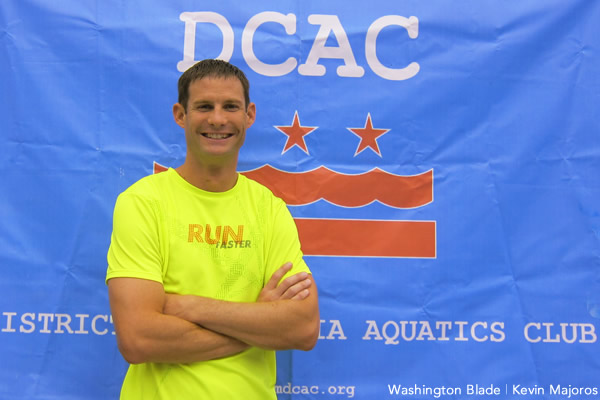
Kevin Donlon has a gay best friend and welcomes the opportunity to compete against him in a gay swimming league. (Washington Blade photo by Kevin Majoros)
Kevin Donlon grew up in California and played lacrosse at St. Mary’s College of California. After college, he switched over to U.S. Masters Swimming and began competing in triathlons. In 2012, he went with a friend to Darwin, Australia for the Asia Pacific Outgames and last week competed at his first Gay Games.
“My best friend is gay and I welcome any opportunity to spend time and compete with my friend,” says Donlon.
Donlon trains in California and was a popular addition to the District of Columbia Aquatics Club contingent at the Games. He says he found the LGBT swimmers to be kind, welcoming, happy and an easy group to integrate into.
“People struck up conversations with me more often than what I have experienced at straight meets,” says Donlon. “And for an unexpected added bonus, the friendliness of the swimmers offered me the opportunity to strike up conversations, which is not something I usually do.”
Donlon won a bronze medal in open water swimming and a gold medal in the 1500 freestyle at the pool.
An unexpected twist to the intermingling of straight and LGBT athletes is that the flip side of the trend is also happening. Gay athletes are switching to straight leagues.
Kyle Suib started his rowing career at the University of Delaware and still wanting to compete beyond college, he joined the DC Strokes Rowing Club. He loved his time on the team and made several new friends but realized his competitive spark wasn’t satisfied.
“We were one unit in college and I just couldn’t identify as a gay rower,” says Suib. “I live and die by the sport and I just happen to be gay.”
Suib decided to leave the Strokes and had one of his college coaches give him the needed recommendation to join Potomac Boat Club rowing. He says his new teammates don’t focus on gay or straight. It’s all about the team. There are now four gay men on the Potomac Boat Club team and the four have been joined at Nellie’s and Town by their straight teammates.
“We are a family and now we are a more diverse family,” says Suib.
Arts & Entertainment
How queer Baltimore artists are building strong community spaces
Fruit Camp is home to tattoo artists, musicians, herbalist, and more

Fruit Camp, a tattoo and art studio in the Remington neighborhood of Baltimore, opened with a bang in February of 2020. “We had a big opening party. It was really fun. Everybody came,” says Geo Mccandlish, one of the co-founders. “It was the last rager I went to,” they said.
The pandemic shut down their shop—alongside the world—for months, but the shop survived. “We just put our stimulus checks into keeping the rent paid,” says Emi Lynn Holler, the other co-founder.
They had built the space without loans, on a low-budget, do-it-yourself ethos with hands-on help from their community. “The deeply punk shoestring budget background worked really to our advantage,” says Mccandlish.
While it wasn’t ideal, it was fitting. Mccandlish and Holler’s artistic partnership has almost always lived at the crossroads of community, DIY, and extraordinary circumstances. A decade ago they met as residents of the Bell Foundry, an arts co-op and co-living space, where sharing knowledge, making community, and living cheaply were key to getting by.
It was there that Holler gifted Mccandlish their first tattooing machine and taught them how to use it. And it was where the two of them—who also do printmaking, fiber arts, and other creative activities—started imagining co-founding a space of their own. That dream felt more urgent in 2016 when Baltimore condemned the Bell Foundry and evicted the residents, including Mccandlish, during a nationwide crackdown on artist co-ops after the Ghost Ship fire in Oakland.
Holler had by then moved to Massachusetts to pursue formal tattoo education and certifications.
“Living inside that level of precarity,” Mccandlish explains, “made us want to figure out a hybrid,” between the unique, collaborative Bell Foundry and a licensed, commercial space. “We wanted to find a way to create more safety,” says Holler.
But they didn’t just want to create safety for the two of them. When looking at spaces, they opted to lease a bigger studio—a two-story, double-row house with room for tattooing on the first floor and small studios on the second. Mccandlish said the prospect of a larger project felt “tantalizing and precious” because they felt “if you have access to something, you try to make sure that every resource that is a part of it is also shared.”
Today, in addition to tattoos, Fruit Camp holds studios for musicians, fiber artists, an herbalist, a massage therapist, and a doula. “We’re able to incubate and hold nontraditional pathways to different kinds of creative practices,” says Mccandlish.
You can consider Fruit Camp a queer business by several definitions. For one, every member of the studio identifies as queer, in some way. It also looks queer. “It’s campy and it’s pink, and we have a lot of gay art hanging around,” explains Mccandlish.
Holler says sometimes they get asked about losing potential patrons by being openly queer, but that isn’t a worry. “I think it only strengthens us,” they say. “It brings people to us who also want to find each other in that world.” They pause, “I feel like it boils down to we keep us safe and we take care of ourselves.”
Mccandlish emphasizes that “queer is the political meaning” and the “orientation to” which they do their work as a community space and business. Their shop practices are explicitly queer and trans-friendly—in addition to being “anti-racist, anti-sexist, liberation-oriented, and accessible.” For example, the shop requires masking and has consent-forward and trauma-informed practices in place. They also use cost-sharing instead of a traditional profit model with those who work in their space. “The point is not to make as much money as everybody can, the point is to work enough with a low enough cost overhead that everyone can survive without overworking.”
That is a continued goal, not a static place, they explain. “Some of our goals, we haven’t reached yet, like turning into a true worker co-op.”
But they are already making big strides in the community. For example, some patrons tell them that they are the only tattoo studio they feel safe using, due to the universal masking policies. To their knowledge, they are the only shop in Baltimore that has the policy.
Fruit Camp also has a big community name. One day Mccandlish logged onto a community Facebook group and saw an anonymous post asking about queer-friendly tattooers or tattooers who would tattoo someone who has HIV. The post said, “I’ve been turned away from five different shops.”
Immediately Mccandlish went to the comments to write that Fruit Camp would be happy to tattoo them, but instead, they found the comment section full of that recommendation already. It warmed their heart. “That feels like a very minor way that [our work] is so important.”
(This story is part of the Digital Equity Local Voices Fellowship lab through News is Out. The lab initiative is made possible with support from Comcast NBCUniversal.)
Theater
Timely comedy ‘Fake It’ focuses on Native American themes
Arena Stage production features two out actors

‘Fake It Until You Make It’
Through May 4
Arena Stage, 1101 Sixth St., S.W.
Tickets start at $59
Arenastage.org
A farce requires teamwork. And Larissa FastHorse’s “Fake It Until You Make It” now at Arena Stage is no exception.
The timely comedy focuses on Native American nonprofits fractiously housed in a shared space. Friction rises when rivals River (Amy Brenneman), a white woman operating in the Indigenous world, goes up against the more authentic Wynona (Shyla Lefner) to win a lucrative Native-funded grant.
While Brenneman (best known for TV’s Judging Amy) is undeniably a big draw, it takes a group collaboration to hit marks, land jokes, and pull off the well-executed physical comedy including all those carefully timed door slams.
As members of the six-person “Fake It” cast, Brandon Delsid and Eric Stanton Betts, both out actors of partly indigenous ancestry, contribute to the mayhem. Respectively, Delsid and Betts play Krys and Mark, a pair of two-spirited Native Americans who meet farcically cute and enjoy one of the play’s more satisfying arcs.
For Krys, every attractive man is a potential next fling, but when Mark, handsome and relatively reserved, arrives on the scene, it’s something entirely different.
Both onstage and sometimes off, Betts plays the straight man to Delsid’s waggishness. But when it comes down to real life business, the friends are on the same page: not only are the L.A.-based, up-and-coming actors intensely serious about their film and stage careers, but they’re also particularly engaged in the themes of Indigenous People found in “Fake It.”
On a recent Wednesday following a matinee and an audience talkback, they were ready for a phone interview.
In establishing whose voice was whose, Delsid clarified with “I’m the one who sounds a little like a Valley girl.”
WASHINGTON BLADE: Brandon, you’ve been with the show since its early work-shopping days in 2022 and through its debut in Los Angeles and now Washington. Have things evolved?
BRANDON DELSID: Definitely. I’ve grown up in the last couple of years and so has my character; it’s hard to know where I end and Kry begins. There’s been a real melding.
Eric and I are both queer, and to get to play these roles that are so human, imperfect, sexy, and interesting is really joyful.
As queer artists you don’t always get the chance to do work like this. So many stories are queer trauma, which is incredibly important, but it’s liberating to feel joy and ride it off into the sunset, which, without revealing too much, is kind of what we get to do.
BLADE: There’s some race shifting in “Fake It” particularly with regard to “pretendian” (a pejorative term describing a person who has falsely claimed Indigenous status).
ERIC STANTON BETTS: The last few years I’ve been on a journey with my cultural identity and place in the world. I’m a mixed BIPOC artist, my dad is Black and Native American by way of the Cherokee tribe and my mom is white.
Since 2020, I’ve tried to figure out where I belong in this cultural history that I haven’t had a tie to throughout my life; it’s gratifying to find my way back to my indigeneity and be welcomed.
In the play, race shifting is introduced through farce. But it’s never in a disrespectful way; it’s never mocked or done in a way to take away from others. The playwright parallels race shifting with gender fluidity.
DELSID: But in life, there are people posing as Indigenous, actively taking grants, and the play goes there, we don’t hold back. Larissa, our playwright, has made it clear that she’s not trying to figure it out for us. With that in mind, we hope people leave the theater interested and curious to learn more.
BLADE: Mark arrives kind of the middle of some crazy drama, bringing along a jolt of romance.
BETTS: Yeah, when I show up, we’re all sort of shot out of a cannon, struggling to keep up with the initial lie.
DESLID: A very gay cannon.
BLADE: What’s up next for you two?
BETTS: Both Brandon and I are up for the same part in a TV pilot, so one of us may be getting some very good news. I also have a Tyler Perry film coming out soon [he plays a model, not an unfamiliar gig for Betts].
DELSID: Coming up, I have a recurring part on HBO’s “The Rehearsal,” and a supporting part in “June and John,” a John Besson film. But doing “Fake It Until You Make It” in L.A. and now D.C. has been a special time in our lives. It’s 23/7 togetherness. There’s that hour for sleep.
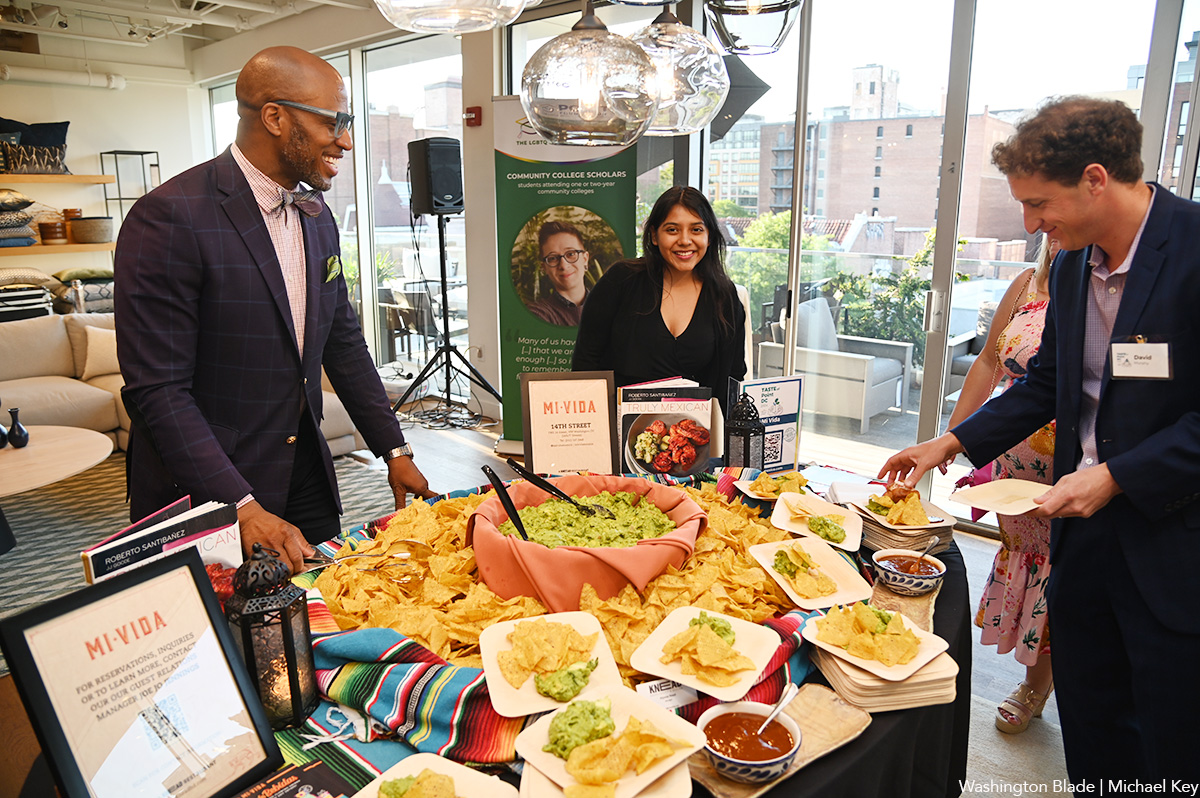
Point Foundation will host its annual “Taste of Point Reception” on Wednesday, May 7 at 6:30 p.m. at Room & Board.
The popular event will take place on the top floor and outdoor terrace at Room & Board, featuring small plates from area restaurants, hand-crafted cocktails from local mixologists, and a speaking portion where guests will hear directly from Point Foundation scholars. This year, Point is supporting a record-breaking class of 755 scholars and guests’ support will allow Point to continue its mission. Point Foundation is the nation’s largest scholarship-granting organization for LGBTQ students of merit.
Tickets are tax deductible and can be purchased at Point’s website.
-

 Federal Government4 days ago
Federal Government4 days agoHHS to retire 988 crisis lifeline for LGBTQ youth
-

 Opinions4 days ago
Opinions4 days agoDavid Hogg’s arrogant, self-indulgent stunt
-

 District of Columbia4 days ago
District of Columbia4 days agoD.C. police seek help in identifying suspect in anti-gay threats case
-

 Virginia4 days ago
Virginia4 days agoGay talk show host wins GOP nom for Va. lieutenant guv

